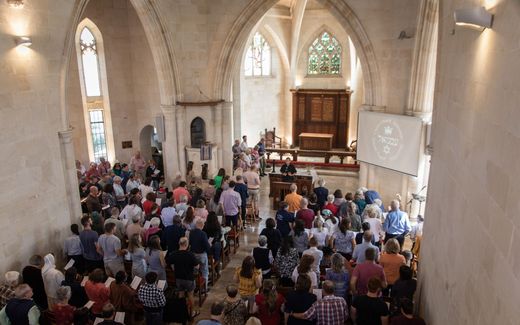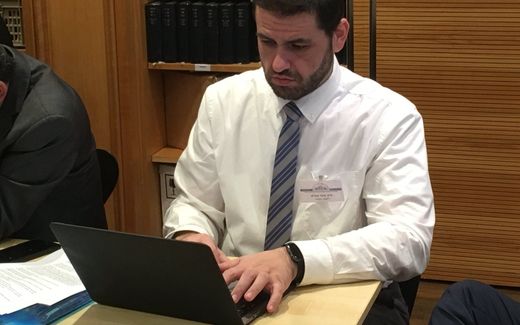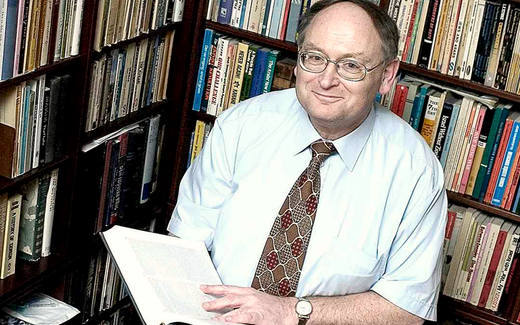Evert’s comment: Believe it or not, but thirty years ago, a photographer took a picture of hope

A moment of hope. Photo AFP, J. David Ake
Opinion
Can you take a photo of “hope”? Well, photographers almost did, one September day in 1993 in the Rose Garden at the White House. We all hoped this would bring a change. And it did change us as Christians as well.
At the time, I was studying journalism and working as a freelancer. The Oslo Peace Accords between Israel and the Palestinians were a big surprise not only for me but also for many experts.
First, the news about the peace deal broke. And then it took a few days before the agreement was also really signed in Washington. US President Clinton invited both leaders: the Israeli Prime Minister Rabin and the Palestinian leader Arafat. And leaders like symbolism: they sat at the same table used for the Camp David Agreements, many years earlier.
But Rabin and Arafat did not only sign. They sealed their signature with a handshake under the leadership of “uncle” Bill Clinton. And that became the photograph that had so much power in it. It has been used many times and received several awards. And I think this photo deserved that. Because it was a shot of hope.
Many people around the world were inspired that peace was not something unthinkable but actually possible. To the pessimists, it said that the Palestinians were not so bad that they never would make peace. And for the optimists, it showed that peace is actually hard work and not easy.
Also, this inspired many Christians to renew their prayers for the Old Land with the two rivalling nations.
Puritan
To be honest, I had expected to see this picture more in the past weeks. For CNE.news, I keep an eye on many media in Europe –both Christian and secular– but I only saw three articles about the Oslo Accords. For the rest, ‘Oslo’ seems to have been forgotten.
Remarkably, the three articles were from the Norwegian press: the Christian daily Dagen and the news site Norge Idag. Of course, they feel more connected to this because the process started in their capital Oslo.
And there might be another reason as well: these newspapers feel connected to Pentecostal Christianity that has a special place for Israel. For the Lutheran Church of Norway, this would not be so self-evident.
I have no Pentecostal background but more Puritan Reformed. Also, for us, it was not unusual to speak about “unfulfilled promises” for Israel. For me, the most explicit one is Romans 11,26: “All Israel will be saved”. Through the ages, many interpreters had applied these words on the Christian church. But the Puritans in the ages after the Reformation had said this was meant for the Jewish people as a nation. Of course, this was long before the (new) Israeli state in 1948.
In my memory, the enthusiasm that came after the Oslo Accords was so strong, that also many conservative Christians started to think anew about Israel. And nowadays, I sometimes hear myself saying that God’s promise in the Letter of Romans (“all Israel will be saved”) has nothing to do with the State of Israel but with the Jews as a people. Half of all the Jews don’t even live in Israel but in Poland, France or America. They are part of this promise as well. And more: the promise is not political but spiritual. In short, God says that the Jewish nation will discover Jesus as the Messiah. That applies as much to the Jew in my hometown as to the rabbi in Jerusalem.
Tension
Earlier this year, there was much attention for the 75th anniversary of the state of Israel. That might be remarkable, but it is understandable as well. Israel is not a state like all the others. It is a new state, formed by people from all over the world, who have one thing together: they are Jews. And that seems to be strong enough to survive, although the internal debates increase.
On the other hand, Israel receives a lot of criticism as well. Especially international bodies –like the European Union– are in constant debate with the Jewish state. The American scholar Todd Huizinga explained this to me a couple of years ago. “It is no coincidence that the EU and Israel are always at odds with each other. Israel is the antithesis of the EU. It is a proud ethno-religious nation-state. The EU strives for a post-ethnic, post-religious, post-national state. The European elite will therefore always be annoyed by Israel,” Huizinga said in an interview about his book “The New Totalitarian Temptation”. I have never heard this so clearly. If this is true, there is no way to prevent the EU from criticising Israel, since this tension is part of each other’s DNA.
Optimist
For many Christians, declaring the state of Israel in 1948 was just a “resurrection” of the old Jewish state(s) under the Old Testament kings. That became clear when President Trump moved the US embassy from Tel Aviv to Jerusalem in 2018. Some said, we know already 3,000 years that Jerusalem is the capital of Israel, so we don’t have to debate that.
Of course, that is not true. The present state of Israel might have a historical example, but is in itself a modern phenomenon.
In this context, it is an important question whether the Biblical land promise is still applicable for today. Genesis 15,18 says: “On that day the LORD made a covenant with Abram, saying, “To your offspring I give this land, from the river of Egypt to the great river, the river Euphrates”.
Theologically, this is not an easy one. During the days of the Reformation, many interpreters said this promise was “until Christ”. Of course, since 1948, we have to reflect on that interpretation.
For myself, I came to the conclusion that it is not important whether the modern state of Israel stands on this land promise or not. It is clear that a godly promise can never be a political claim. This theology cannot justify the “occupation” of the Westbank and the Jewish settlements there. God might have promised all that land (“from the river of Egypt to the great river, the river Euphrates”), but perhaps we have to wait another 40 years before God gives us that. A promise does not mean we should anticipate and hasten its fulfilment.
The state of Israel does not need this ancient land promise either for its existence. It has a basis in international law with the UN approval of the Partition Plan in 1947.
People might say: well, this is no Biblical law. No, it is not. But international law also is a form of righteousness. That is a holy matter. My country, Holland, also is based on international and historical justice. We know this is a righteous case. We could have prayed for that. We cannot make it more just or more holy. Could this be enough for Israel too?
Of course, this would imply that Israel has to keep itself within the boundaries of (international) law as well. But yes, the holiness of justice means that righteousness is for the other as much as for myself. Israel has still to find a way to deal with the other nation on its territory, the Palestinians. And that’s why the picture from the Rose Garden in 1993 gave us hope. We never thought that that moment could come. And since I am an optimist, I say: It still can come!
Related Articles












